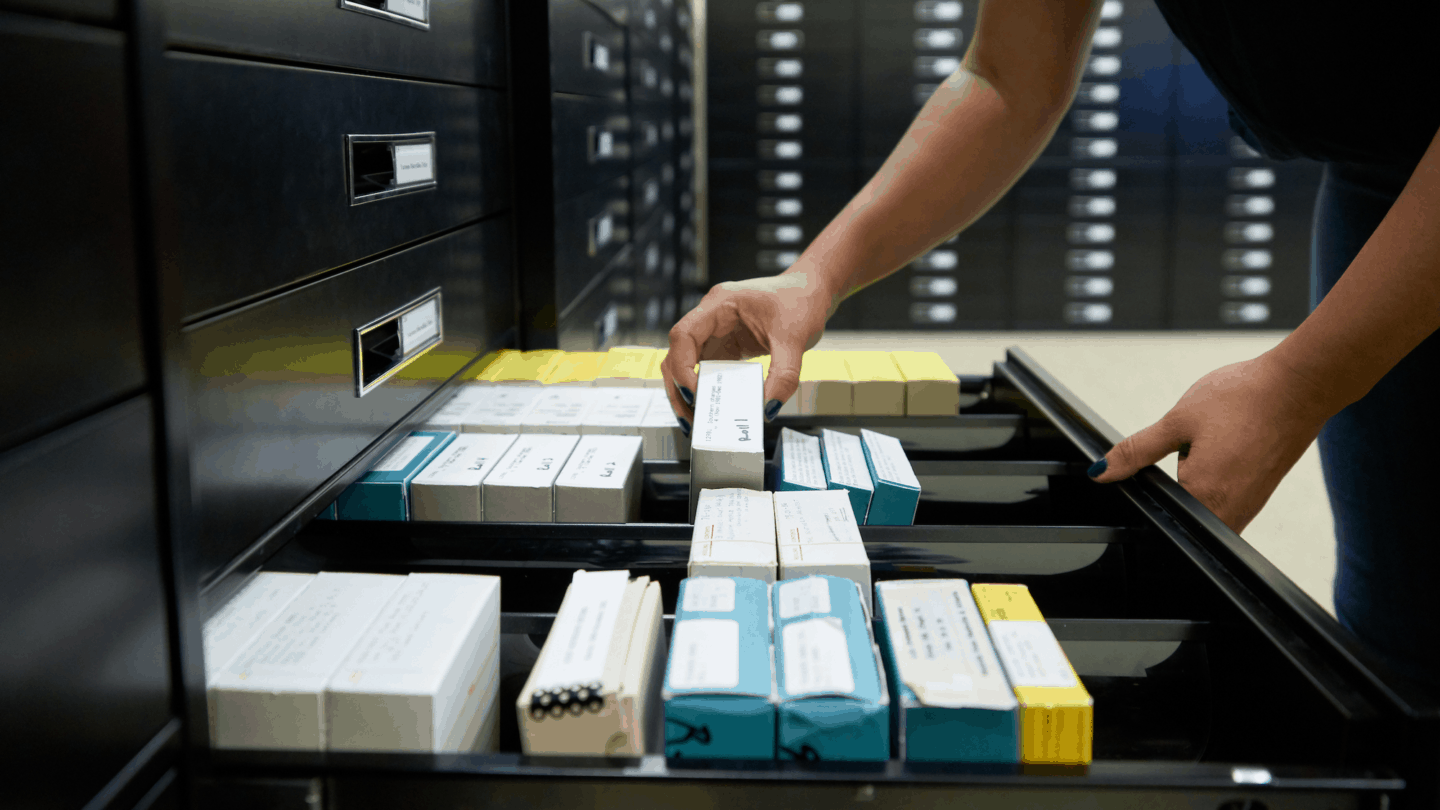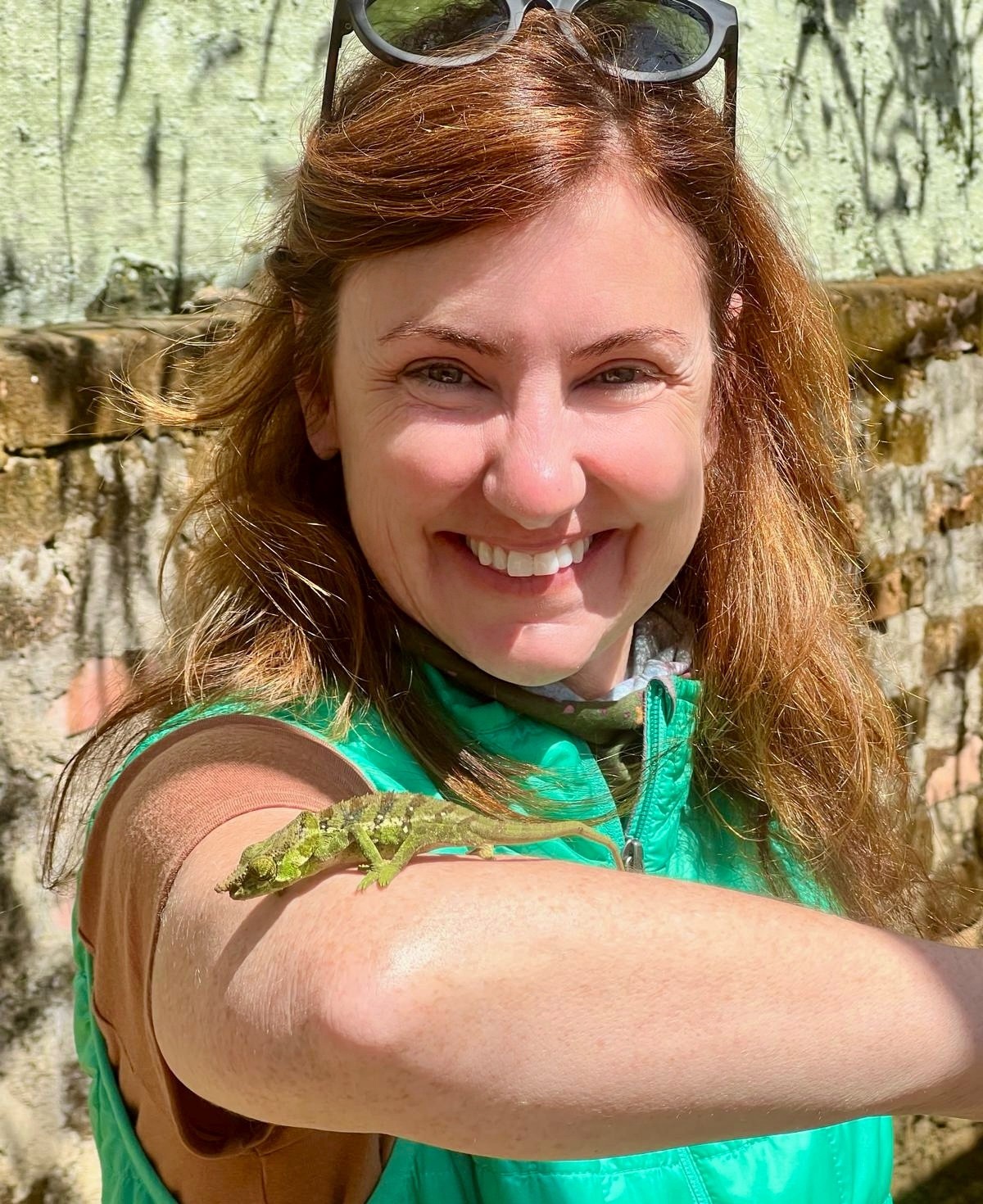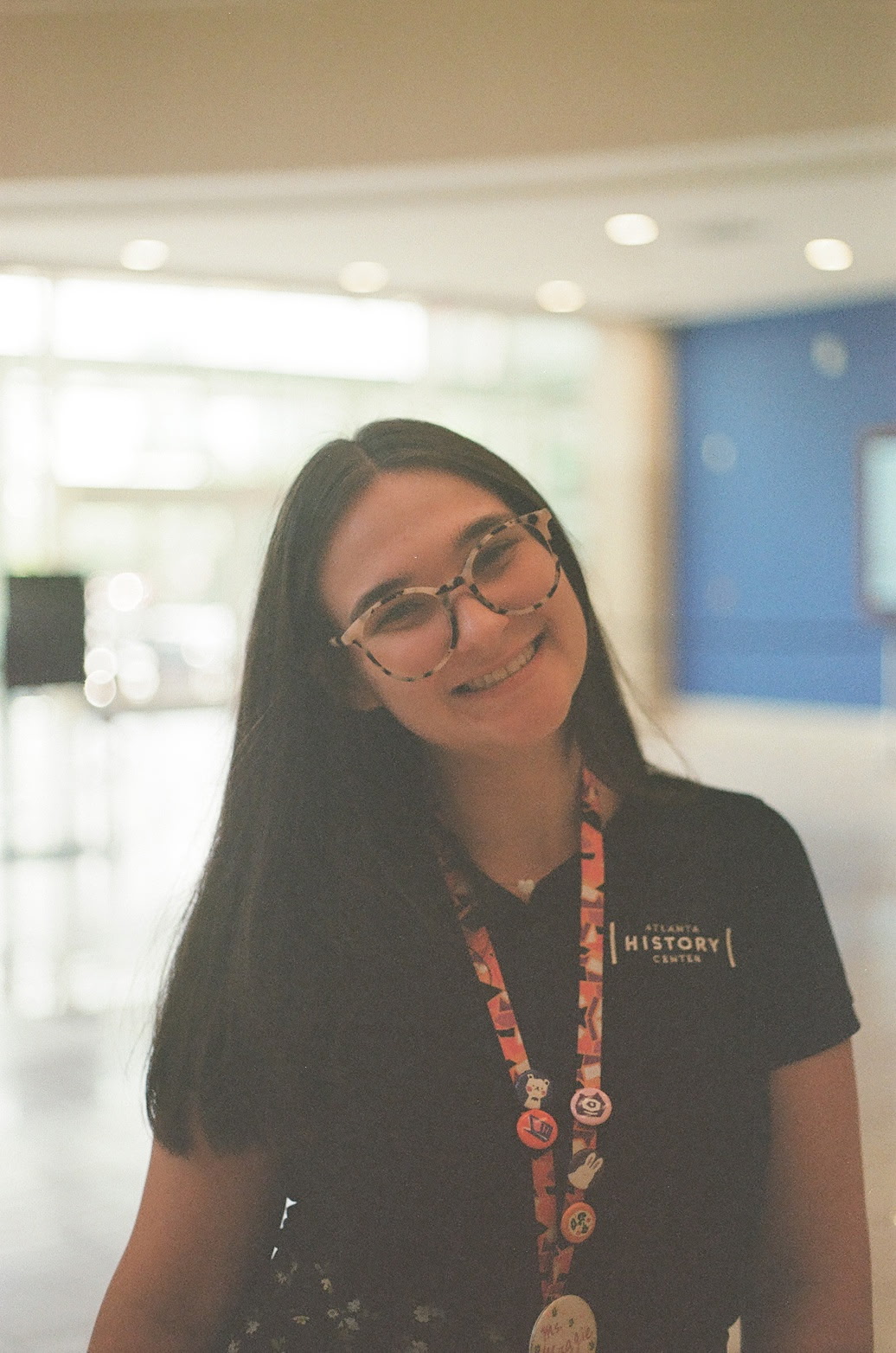
We headed over to the Kenan Research Center to ask our team of archivists and experts your most pressing questions: what’s your favorite thing in Atlanta History Center’s extensive collections? How do you decide what belongs in the archive? And why are archives so important?
Why Archives Are Important?
“Every letter, photograph, and diary is a window into a life lived. Archives preserve these windows, holding the stories of families, communities, and cultures, so that each life and each story continues to inspire.”
— Staci C., MHP, Hon. ASLA
Senior Director of Cherokee Garden Library

What Do You Do on a Daily Basis?
“The wonderful part of being an archivist is that one day almost never looks the same. I might be creating finding aids or working with our digital collections, coordinating with donors, assisting other departments at AHC, supervising interns, working on grant projects, or helping out in our reading room based on what our priorities are for any given week.”
— Kate D.
Visual Culture Archivist
“While my job title says, “Research Assistant”, there’s a lot of different elements to what I do every day. I help prepare materials for research appointments, but I also function as a sort of department assistant. This means I get lots of cool odd jobs, like pulling items to be scanned for exhibits or Ancestry.com, helping with our Oral History Project, and compiling statistics to create our monthly reports. I also work with stacks maintenance, moving around donations from our incoming area to our uncategorized collections storage. Jobs like this help make sure we have room to continue the important work of growing our collection.”
— Maggie I.
Research Assistant

“As the Processing Archivist, my job tasks vary on a daily (or project) basis but usually I am organizing documents and visual materials, creating and editing finding aids on ArchivesSpace, humidifying materials, conducting historical research, rehousing and sleeving materials, and entering metadata for several visual collections on the Atlanta History Center’s ALBUM database.”
— Ariana L.
Processing Archivist
“As a project archivist, my weekly/daily routine is pretty static, in that I am working on the same collection for months to a year. Currently, I am finishing up collections a part of the NHPRC grant. With that my daily routine can range from reading documents and inputting its metadata, researching and verifying land areas (I’m working on appraisals), and uploading to Archives Space.”
— Mariah I.
Project Archivist

What is the Most Interesting Thing You Have Discovered on the Job?
“Because my day-to-day varies so much, I discover new and interesting things each day, so it’s difficult to pick a single object or collection. However, each collection we encounter has a unique story with a lot of depth, and I think having the opportunity to encounter these stories through the primary sources is one of the most interesting aspects of my work.”
— Kate D.
Visual Archivist
How Can Archives Help Educators?
“Coming from AHC’s Education Department, I’ve always understood that archives and education go hand in hand. Any history teacher knows the importance of teaching students to analyze primary source documents, but I believe archives can be a true asset to engaging lesson plans outside of the classroom. While most archives don’t travel to you, we are able to schedule field trips, or research sessions for older students interested in historical research. We also have loads of great resources that could be used for lesson planning, many of which are available online via our website. These include museum objects, photographs, videos, and some scanned manuscript items. Our primary sources can help students engage with history in new ways and teach them the impact of historical events on the modern world.”
— Maggie I.
Research Assistant
“Archives can help educators in a variety of ways. Archival materials are primary source materials, and often research requires using primary source materials, which can be accessed either in-person or online. Archival materials can also be incorporated into instruction for a variety of subjects and education levels, and it gives the students and educators a chance to interact with history in a tangible format.”
— Mariah I.
Project Archivist
How Can I Preserve Family Photos?
“I always tell people that there are different levels of preservation based on your budget, but the main thing to keep in mind is to store your photographs in an area with low light levels and low humidity, and to only handle them with nitrile gloves as fingerprints can permanently damage photographs and negatives. You can also put photographs and negatives in archival sleeves that have passed the Photo Activity Test (P.A.T.) as your budget allows. For more information or questions about materials in your collection, you can contact me! I love chatting about how to preserve collections!”
— Kate D.
Visual Archivist
What’s Your Favorite Item in Your Collection?
“Landscape plan for the Fulton County Botanical Garden, 1941, VIS 426.001
This landscape plan helps tell the fascinating and largely unknown story of Atlanta’s first botanical garden.”
— Jennie O., MSLS
Cherokee Garden Library Senior Technical Librarian and Supervisory Archivist
“We have so many interesting collections that cover a broad range of topics that it’s impossible to pick a favorite. I feel like I encounter new favorites almost daily. For example, I recently had to pull some materials for an event, and I came across the architectural drawings for the Trust Company of Georgia Northeast Expressway bank branch (which is still on Monroe Drive). The drawings themselves are impressive works of art, and it’s such an architecturally interesting building. However, tomorrow I’ll probably have a new favorite!”
— Kate D.
Visual Archivist
What is Your Proudest Moment in Archiving?
“Because I supervise the bulk of our interns, I really love seeing my former interns emerge into the archival field and bring their knowledge of what they learn at the Kenan Research Center into their careers.”
— Kate D.
Visual Archivist
“So far, I think my proudest moment in archiving has to be reprocessing and publishing the Grace Towns Hamiliton papers collection. The collection is very impressive because of the extensive number of materials that Grace collected throughout her life in regard to personal life, political career, and organizational ties. More importantly, the collection consisted of years of work done by interns and other archival staff so, I am extremely glad to be the one to finally share all of our hard work and contributions with the public. “
— Ariana L.
Processing Archivist
What’s the Most Recently Processed Item in Your Collection?
Southeastern United States map for the Cherokee Garden Library map collection, 1799, VIS 521.001
[Southeastern United States] Carte des Carolines meridionale et septentrionale, la Georgie, la Florida, Orientale et Occidentale, le Pays Des Cherokees, la Vaste Contree Des Muscogules, en la conferation des Creks et Pays des Chataws by J. B. Poirson, 1799.
— Jennie O., MSLS
Cherokee Garden Library Senior Technical Librarian and Supervisory Archivist
What Would You Say to Someone Interested in a Career in Archives?
“There isn’t one path to working in the archives! The archival profession is very expansive and interdisciplinary, as some can work in an academic, museum, corporate, or government setting. It is a niche field, but there is room for everyone when it comes to preserving history. “
— Mariah I.
Project Archivist
“My advice would be to do whatever you can to get your foot in the door. The first job probably isn’t going to be the dream job but keep an open mind and you never know where it will end up. If I hadn’t started as a school tour guide at the History Center in July of 2023, I never would have formed the network that connected me with the KRC. Because of my status as an employee of a different department, I was able to spend my afternoons volunteering once or twice a week down here and eventually was lucky enough to get the job I have now in February of 2025. Who you know is everything in the professional world, so apply to that internship, join that volunteer program, and always give everything your best shot, even if it’s not what you expected to be doing. You never know where you’ll end up!”
— Maggie I.
Research Assistant
“If you are interested in archival work, a master’s degree in library science, archival studies, history, or another relevant degree is required, but beyond that, my biggest recommendation is to get involved through internships or volunteer opportunities and professional organizations. The Society of Georgia Archivists is made up of some of the most knowledgeable archivists in the field, and I highly recommend not only joining the organization, but getting involved in the various committees and activities.”
— Kate D.
Visual Archives